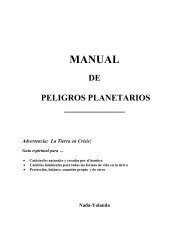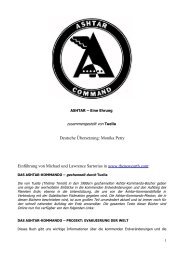ALIEN INTERVIEW - THE NEW EARTH - Earth Changes and The ...
ALIEN INTERVIEW - THE NEW EARTH - Earth Changes and The ...
ALIEN INTERVIEW - THE NEW EARTH - Earth Changes and The ...
You also want an ePaper? Increase the reach of your titles
YUMPU automatically turns print PDFs into web optimized ePapers that Google loves.
163 "Homer, the blind Greek poet..."<br />
"Homer (ancient Greek: µηρος, Homēros) was an ancient Greek (Ionian) epic poet,<br />
traditionally considered the author of the epic poems the Iliad <strong>and</strong> the Odyssey. No reliable<br />
biographical information about Homer survives from classical antiquity. <strong>The</strong> cardinal<br />
qualities of the style of Homer have been well articulated by Matthew Arnold: "the translator<br />
of Homer," he says, "should above all be penetrated by a sense of the four qualities of his<br />
author: that he is eminently rapid; that he is eminently plain <strong>and</strong> direct, both in the evolution<br />
of his thought <strong>and</strong> in the expression of it, that is, both in his syntax <strong>and</strong> in his words; that he<br />
is eminently plain <strong>and</strong> direct in the substance of his thought, that is, in his matter <strong>and</strong> ideas;<br />
<strong>and</strong> finally, that he is eminently noble".<br />
<strong>The</strong> language used by Homer is an archaic version of Ionic Greek, with admixtures from<br />
certain other dialects, such as Aeolic Greek. It later served as the basis of Epic Greek, the<br />
language of epic poetry, typically in dactylic hexameter.<br />
A number of traditions hold that he was blind (perhaps because, in the Aeolian dialect of<br />
Cyme, homēros bore this meaning) <strong>and</strong> that he was born on the isl<strong>and</strong> of Chios, at Smyrna<br />
or elsewhere in Ionia, where various cities vied in claiming him as one of their native sons.<br />
<strong>The</strong> characterization of Homer as a blind bard is supported by a possibly self-referential<br />
passage in the Odyssey in which a shipwrecked Odysseus listens to the tales of a blind bard<br />
named Demodocus while in the court of the Phaeacian king."<br />
-- Reference: Wikipedia.org<br />
164 "Solon, a wise man from Greece reported the existence of Atlantis.."<br />
"Solon was a famous Athenian statesman, lawmaker, <strong>and</strong> Lyric poet. <strong>The</strong> travel writer,<br />
Pausanias, listed Solon among the Seven Sages of the ancient world. Solon has acquired a<br />
place in history <strong>and</strong> in folklore through his efforts to legislate against political, economic <strong>and</strong><br />
moral decline in archaic Athens. Some of his reforms failed in the short term, yet he is often<br />
credited with having laid the foundations for Athenian democracy.<br />
After he had finished reforming the country, Solon traveled abroad. His first stop was Egypt.<br />
<strong>The</strong>re he visited Heliopolis, where he discussed philosophy with an Egyptian expert on the<br />
subject, Psenophis. Subsequently, at Sais, he visited Neith's temple <strong>and</strong> received from<br />
the priests there an account of the history of Atlantis. Solon wrote out this history as<br />
a poem, to which Plato subsequently made references in his dialogues Timaios <strong>and</strong><br />
Critias. Next Solon sailed to Cyprus, where he oversaw the construction of a new capital for<br />
a local king, in gratitude for which the king named it Soloi."<br />
-- Reference: Wikipedia.org<br />
165 " Zoroaster..."<br />
"Zoroaster, the prophet <strong>and</strong> poet sees the universe as the cosmic struggle between aša<br />
“truth” <strong>and</strong> druj “lie.” <strong>The</strong> cardinal concept of aša - which is highly nuanced <strong>and</strong> only vaguely<br />
translatable - is at the foundation of all other Zoroastrian doctrine, including that of Ahura<br />
Mazda (who is aša), creation (that is aša), existence (that is aša) <strong>and</strong> Free Will, which is<br />
arguably Zoroaster’s greatest contribution to religious philosophy. <strong>The</strong> purpose of<br />
humankind, like that of all other creation, is to sustain aša. For humankind, this occurs<br />
through active participation in life <strong>and</strong> the exercise of good thoughts, words <strong>and</strong> deeds.<br />
268





